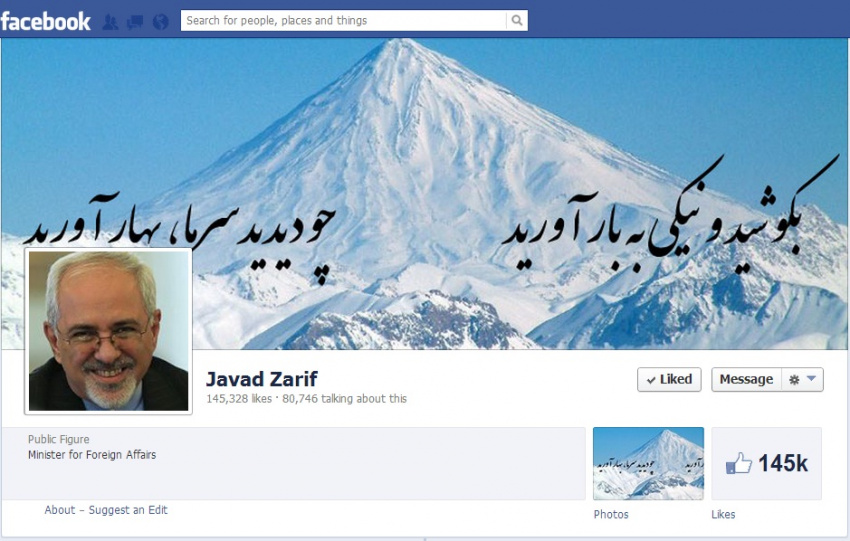Facebook & Foreign Policy

The Iranian Foreign Minister Mohammad Javad Zarif of the newly moderate government has used Facebook as a new platform to announce his views and communicate with the public on both a national and international level. As this may seem a novel way to address the public and defend Iran’s foreign policy views regarding, it actually supersede in terms of effectiveness the traditional venues in which the FM would make statements at a press conference or would have the spokesperson convey the position of the country. As Dr Zarif‘s technology friendly character and his keens in joining social network websites such as Facebook and Twitter has given Iran a new turn in voicing its position and communication with ordinary citizens without the traditional barriers. In his Facebook page he has been receiving the over reaching about 95,000 likes. His active role in Facebook thus could be a way to enhance Iran’s public diplomacy.
Iranian FM Mohammad Javad Zarif is known to be gadget-friendly and prior to his position as Iranian FM, he checked and updated his Facebook account frequently. Even though now he has less time, he has not turned away from this popular social network website and rather has used it as a way to display his points of view and engage with the public on foreign policy issues at critical times such as now where there are serious debates on a war in Syria.
Facebook is quite popular everywhere and especially in Iran, though filtered it plays an important role in raising awareness and engaging the public on critical issues among the public youth without having to go through the so-called formal /diplomatic channels. Thus the FM is using modern technology and social network websites as a stage to echo Iran’s position.
Inside Iran however, there has been controversies regarding the eligibility of the membership of high-ranking officials in social network websites such as Facebook and Twitter; for these websites are filtered according to Iran’s official law. Ishaq Jahangiri, the President’s First Deputy, FM Mohammad Javad Zarif and FM spokesperson Marzieh Afkham have an active Facebook account and post their views. The right wing Khabar-online website has criticized the membership of these officials in Facebook and has questioned their membership in Facebook in terms of legality. According a reading of the law, although the website is filtered and one would need proxifiers to log into Facebook, it is legal for the officials because they are allowed to have access to internet without any boundaries. Ayatollah Khamenei’s website also has commented about having a Facebook account and mentions: “while transgressing the law is not allowed and Facebook is a potentially criminal social network, people who are members should be alert and watch their acts.” Thus, having a Facebook account has not been abandoned strictly rather people must use proxifiers to log into their account. Kazemi Deputy of FATA police also noted that there is no crime under the title of “having a Facebook account” and if one’s information has been misused, she/he could complain to the court. Musa Qazanfar Abadi, member of Majles Legal Commission mentioned that merely being a member of Facebook is not a crime and depends on the person’s activities. Thus while Facebook is filtered, it is not a crime to log into Facebook and have an account. If it would actually serve the national interest, it will certainly be considered “legal”.
Dr Zarif has raised crucial questions on his Facebook page where he has received a great amount of comments, criticisms and likes. On 1 Sep. he posted a short piece with questions about Syria. He has brought up subjects such as “Is war a useful instrument to advance foreign policy or humanitarian responsibilities in the 20th and 21st centuries?” he argued that it is more likely that Bashar Assad's opponents are the ones who used chemical weapons on civilians, and criticizes the West for its unwillingness to condemn the Sardasht and Halabja attacks, where Saddam Hussein used mustard gas and sarin in attacks on Iranian soil and in northern Kurdistan, respectively, killing thousands of civilians. Other issues which pointed to include the West’s intervention and silence regarding the opposition in Syria, the Iran-Iraq war and Iran’s involvement in Syria.
Dr Zarif's Rosh Hashanah greetings– his second tweet since opening an account the Jewish New Year has been seen as an attempt by Iran’s FM to soften the tone of Iran towards the Jewish community. He also mentioned “Jews aren’t our enemies,” when asked by Iran’s Tasnim news agency about his statements on the Holocaust on Twitter on 5 Sept. FM Zarif’s personal involvement in social network websites such as Facebook and Twitter shows his devotion to public diplomacy where he personally has kicked off this major foreign policy organ and conveys Iran’s position in a charming trend.

